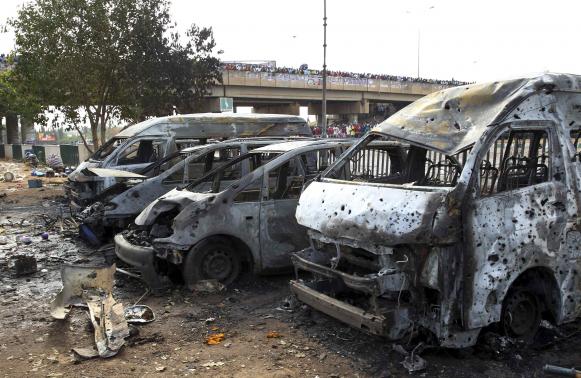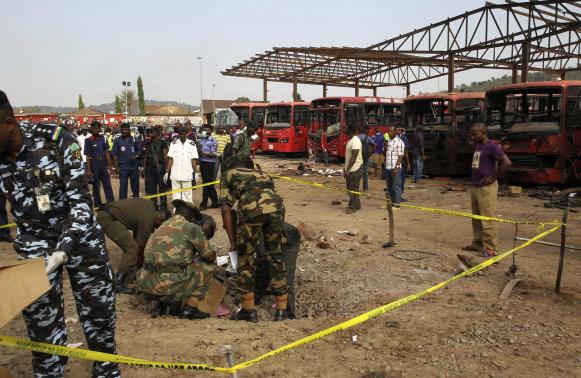www.aljazeerah.info
News, April 2014
Archives
Mission & Name
Conflict Terminology
Editorials
Gaza Holocaust
Gulf War
Isdood
Islam
News
News Photos
Opinion Editorials
US Foreign Policy (Dr. El-Najjar's Articles)
www.aljazeerah.info
|
Editorial Note: The following news reports are summaries from original sources. They may also include corrections of Arabic names and political terminology. Comments are in parentheses. |
71 Nigerians Killed in Bus Station Bombing in Abuja, Boko Haram Accused By Media Without Evidence or claim
April 14, 2014
 |
 |
Nigeria bus station bombing kills 71 on edge of capital
By Isaac Abrak and Felix Onuah
ABUJA Mon Apr 14, 2014 8:37am EDT
(Reuters) -
A morning rush hour bomb killed at least 71 people at a Nigerian bus station on the outskirts of the capital on Monday, raising concerns about the spread of an Islamist insurgency after the deadliest ever attack on Abuja.
Suspicion fell on Boko Haram, though there was no immediate claim of responsibility from the group who are mainly active in the northeast. As well as 71 dead, police said 124 were wounded in the first attack on the federal capital in two years.
Security experts suspect the explosion was inside a vehicle, said Air Commodore Charles Otegbade, director of search and rescue operations. The bus station, 8 km (5 miles) southwest of central Abuja, serves Nyanya, a poor, ethnically and religiously mixed satellite town where many residents work in the city.
"I was waiting to get on a bus when I heard a deafening explosion, then saw smoke," said Mimi Daniels, who escaped from the blast with minor injuries to her arm.
"People were running around in panic."
Bloody remains lay strewn over the ground as security forces struggled to hold back a crowd of onlookers and fire crews hosed down a bus still holding the charred bodies of commuters.
"These are the remains of my friend," said a man, who gave his name as John, holding up a bloodied shirt. "His travel ticket with his name on was in the shirt pocket."
The attack underscored the vulnerability of Nigeria's federal capital, built in the 1980s in the geographic center of the country to replace coastal Lagos as the seat of government for what is now Africa's biggest economy and top oil producer.
Boko Haram militants have largely been confined to the remote northeast. They have been particularly active there over the past few months and are increasingly targeting civilians they accuse of collaborating with the government or security forces.
"NO SURPRISE"
"In some ways it's not a big surprise," said Kole Shettima, director of the Abuja office of U.S. charitable institution, the
MacArthur Foundation. "The situation has been escalating.
"It's a statement that they are still around and they can attack Abuja when they want, and instill fear."
The (suspected group has) in the past year mostly concentrated their attacks in the northeast, where their insurgency started.
There had been no such violence near the capital since suicide car bombers targeted the offices of the newspaper This Day in Abuja and the northern city of Kaduna in April 2012.
Security forces at the time said that was because a Boko Haram cell in neighboring Niger state had been broken up.
A Christmas Day bombing of a church in Madalla, on the outskirts of Abuja, killed 37 people in 2011, although the main suspect in that attack is now behind bars. Boko Haram also claimed responsibility for a bomb attack on the United Nations' Nigeria headquarters that killed 24 people on August 26, 2011.
Boko Haram, which in the Hausa language of northern Nigeria means broadly "Western education is sinful."
(Additional reporting by Camillus Eboh; Writing by Tim Cocks; Editing by Louise Ireland and Alastair Macdonald)
Fair Use Notice
This site contains copyrighted material the
use of which has not always been specifically authorized by the copyright
owner. We are making such material available in our efforts to advance
understanding of environmental, political, human rights, economic,
democracy, scientific, and social justice issues, etc. We believe this
constitutes a 'fair use' of any such copyrighted material as provided for
in section 107 of the US Copyright Law. In accordance with Title 17 U.S.C.
Section 107, the material on this site is
distributed without profit to those
who have expressed a prior interest in receiving the included information
for research and educational purposes. For more information go to: http://www.law.cornell.edu/uscode/17/107.shtml.
If you wish to use copyrighted material from this site for purposes of
your own that go beyond 'fair use', you must obtain permission from the
copyright owner.
|
|
|
|
||
|
||||||


